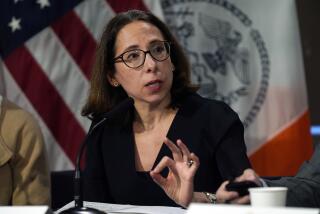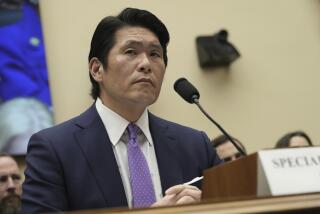Clinton Aide Unaware of Hubbell Contacts
- Share via
WASHINGTON — Former White House Counsel Abner J. Mikva said that his understanding in 1994 was that President Clinton and his top aides were avoiding any contact with Webster L. Hubbell, who had resigned from the Justice Department and come under criminal investigation.
Mikva, a Democrat who served in Congress and as chief judge of the U.S. Circuit Court of Appeals here before Clinton named him counsel in the fall of 1994, said that, as far as he knew--based in part on conversations with the president himself--no one in the White House was in contact with Hubbell.
But unknown to Mikva, a cluster of senior administration officials, including Clinton, remained in touch with the former associate attorney general for months after his resignation. Some of Clinton’s aides and supporters helped arrange employment engagements involving substantial payments for Hubbell. And Clinton himself hosted Hubbell alone for a private weekend at the Camp David, Md., retreat in July 1994. Hubbell was an old friend of the president and a former law partner of First Lady Hillary Rodham Clinton.
The contacts are controversial because Hubbell has been identified as a potentially significant witness in the Whitewater investigation of the Clintons. The Whitewater independent counsel is now investigating whether administration officials and supporters sought to ensure Hubbell’s silence after his resignation through the employment help and continued expressions of support.
Administration officials have said that their help for Hubbell involved only compassion for a friend in trouble and that they thought at the time his legal troubles were confined to a billing dispute with his former law partners.
“I was attempting to help a friend and colleague in a time of need,” said Thomas “Mack” McLarty, a top White House aide who testified Thursday before a federal grand jury about the support efforts for Hubbell. “What I did seemed to me to be the right thing.”
However, Mikva’s recollections indicated that the White House, at the highest levels, recognized the sensitivity of contacts with Hubbell at the time.
Mikva said in an interview Wednesday that his understanding upon joining the administration, was that officials not only were deliberately out of touch with Hubbell then but had been since Hubbell’s resignation.
“During that period, between March [1994] and the time he pled guilty [on Dec. 6, 1994], there was, I think, a pretty conscious effort to avoid contact with Mr. Hubbell,” Mikva said. “I don’t know that people crossed the street when they saw him but there certainly wasn’t any effort to contact him or have meetings with him.”
He said that such contacts would have been viewed as insensitive. “It was just kind of an understanding that lawyers certainly are sensitive to, and the president was certainly sensitive to, that that would not have been the time that it would have been good to have Mr. Hubbell over for a private dinner with the White House counsel or with the president or with anybody in our office, simply because the appearances would be bad,” Mikva said.
Thursday night, Mikva called The Times to amend his remarks after being contacted by the White House about them. The Times had called White House officials, seeking their response.
Mikva said that he had not been aware of any “policy” in 1994 that would have prevented contacts with Hubbell. In hindsight, Mikva said, he would not view such contacts as improper unless the people involved sought to interfere with the investigation of Hubbell or others. He also said he had been unaware of any contacts with Hubbell.
“If you’re asking me, ‘Do I think such contacts are improper?’ I don’t know on what basis, unless there’s something that suggests that they are somehow trying to obstruct justice,” Mikva said.
Generally, Mikva said, “the practice was not to do anything that would look like we were interfering with the investigatory process.”
Lanny J. Davis, a special White House counsel, defended the contacts with Hubbell. Those conversations, Davis said, were based on “personal friendship.”
“We are unaware of any policy or practice prior to December 1994 that suggested there was anything wrong in contacts with Mr. Hubbell by individuals who believed what he said, namely, that he had done nothing wrong,” Davis said.
Hubbell pleaded guilty to fraud and tax evasion charges in December 1994 in connection with improper billings at his Little Rock, Ark., law firm and served 16 months in prison. The plea bargain involved a pledge that Hubbell would fully cooperate with the Whitewater investigation. Officials close to that inquiry have indicated dissatisfaction with the extent of his cooperation.
After Hubbell’s resignation in March 1994 two of the president’s most trusted aides kept in touch with him. They were Deputy White House Counsel Bruce Lindsey and Marsha Scott, who now is chief of staff of the Office of Presidential Personnel.
Lindsey spoke with him by phone on Thanksgiving Day 1995, when Hubbell was at a federal prison in Cumberland, Md., a White House official confirmed. Lindsey called from Scott’s home in Washington. Internal White House telephone records obtained by The Times also show that Hubbell called and left messages for Lindsey at his office as late as July 25, 1994.
Scott, as reported by The Times two months ago, visited Hubbell often at prison and conveyed messages between him and Mrs. Clinton, for whom she performed other confidential tasks.
Davis said that both Scott’s and Lindsey’s contacts with Hubbell were social. He said that Lindsey’s Thanksgiving call was his only contact after Hubbell’s guilty plea.
“On occasion they did talk,” Davis said. “After all, they were friends and they talked as friends. However, Mr. Lindsey does not recall ever having a substantive conversation with Mr. Hubbell about his situation with his law firm.”
The extensive efforts made by top administration officials to arrange financial assistance for Hubbell in 1994--with the knowledge of Mrs. Clinton--are now under investigation by both independent counsel Kenneth W. Starr and congressional committees because of his position as a potential Whitewater witness.
Hubbell’s deals, in which a dozen or more employers collectively paid him hundreds of thousands of dollars in 1994 and 1995, followed calls that were placed by presidential aides and top campaign contributors.
Among those who sought to assist Hubbell or his family were McLarty; Erskine Bowles, who at the time headed the Small Business Administration and now is the White House chief of staff, and Mickey Kantor, who at the time was a member of Clinton’s Cabinet.
Hubbell until 1993 worked at the Rose Law Firm with Mrs. Clinton, who performed legal work for Madison Guaranty Savings & Loan, a now-failed Arkansas thrift at the center of the Whitewater controversy.
Billing records long sought by Whitewater prosecutors, discovered in the Clinton’s White House living quarters in January 1996, indicated that Mrs. Clinton worked on a land option agreement that helped facilitate what banking regulators have concluded was a sham land transaction. The land deal was funded by Madison Guaranty and involved one of Hubbell’s clients.
Investigators have been seeking more information from Hubbell about the transaction, but he has said he has little recollection of it.
Clinton and his spokesmen have said recently that they did not know the gravity of the billing matter at Rose.
However, there were a number of indications in 1994 that Hubbell’s problems were far more serious.
Lawyers at Rose in March 1994 formally referred their findings on Hubbell’s conduct to the disciplinary unit of the Arkansas Supreme Court. And within two days of that referral, which was reported widely by news organizations, Robert B. Fiske Jr., then the Whitewater special counsel, began to investigate Hubbell’s conduct at the Rose firm.
According to people familiar with the matter, Fiske’s office subpoenaed Hubbell’s billing documents in May 1994.
Mikva, 71, who resigned from the White House Oct. 31, 1995, and now teaches at the University of Chicago Law School, said Wednesday that he recalled the president once voicing his concern over Hubbell’s predicament.
“I do remember his saying, at one occasion, I don’t remember if I was alone with him or whether there were other people there, that it was sad that Mr. Hubbell was going through all this travail, particularly if it was an effort to get any information from him about Whitewater,” Mikva said, “because, as far as the president knew, Mr. Hubbell didn’t know anything about Whitewater and there was nothing to know.”
Hubbell told AP earlier this month that the last time he spoke directly with the Clintons was on Thanksgiving Day 1994, when they called him regarding news reports that he was about to be indicted.
“The first lady . . . urged me to fight it,” Hubbell said.
More to Read
Sign up for Essential California
The most important California stories and recommendations in your inbox every morning.
You may occasionally receive promotional content from the Los Angeles Times.














